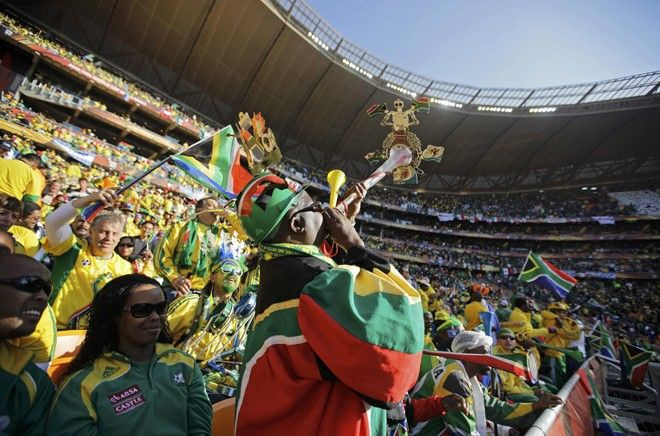Vuvuzelas For Zuma: Why South Africa’s 2014 Elections Won’t Matter

Cover your ears, everyone: The vuvuzelas are back.
Soccer fans will remember this single-note wind instrument, which Urban Dictionary defines as a “a mind-numbing torture device made of cheap, brightly colored plastic,” from the 2010 FIFA World Cup tournament in South Africa. The horns had been mass-produced for fans as noisemakers and souvenirs. They blared endlessly.
The host country was eliminated in the first round of that tournament, but this year the vuvuzelas are celebrating a domestic victory. President Jacob Zuma was re-elected as the leader of the South Africa’s ruling party, the African National Congress, on Tuesday.
The decision was made by 3,977 party delegates, 2,986 of whom cast a ballot for Zuma. His most serious challenger, Deputy President Kgaleme Motlanthe, won just 991.
“From now we must realize that the national conference has spoken and all of us are part of that decision,” said Zuma in his victory speech.
The general election in 2014 will decide who will become South Africa’s next president. But critics of the electoral system will tell you that the poll might as well be scrapped, since its result is essentially a foregone conclusion. And they’re probably right.
The ANC enjoys overwhelming support in South Africa. No other party comes close, despite the fact that the government nominally functions as a multi-party democracy. As the reaffirmed leader of the ANC, Zuma will have his name on the presidential ballot in 2014. And unless the opposition can work some kind of miracle before then, Zuma will coast into a second five-year term in office.
This time, the president will have Cyril Ramaphosa at his side. This wealthy businessman was just elected to serve as the party’s deputy president, and will likely replace Motlanthe to become the country’s deputy president in 2014. His presence will bring some business savvy to Zuma’s ticket, but the ANC’s detractors charge that the ruling party – like the vuvuzela – is stuck in its ways, condemned to play the same maddening note until the day it ceases to function.
The ANC, which had been outlawed by the white-minority regime, came to power in 1994 with Nelson Mandela at the helm. Its ascension heralded the end of decades of apartheid, giving the party a legacy that has made it impossible to beat for 18 years.
Today, South Africa's is the largest economy on the continent. ANC policies have raised standards of living for many of South Africa's 48.8 million people since 1994 by implementing social programs meant to create jobs, build housing, create jobs and promote equality.
But the administration – especially under Zuma – has been plagued by accusations of endemic corruption. Despite years of GDP growth, which is now slowing considerably, South Africa has one of the world's biggest income gaps. Poverty is widespread and unemployment is at 26 percent.
On top of all that, a spate of labor disputes erupted this summer and exposed deep fault lines among the ANC’s base. Strikes affected the mining, farming and transportation industries, and clashes between demonstrators and authorities killed at least 50 people. The crisis recalled painful memories from South Africa’s apartheid era –- except this time, many young and poor South Africans see the ANC as their main oppressor.
That’s why the ANC Youth League, a faction of the party that does not support Zuma, threw its weight behind Motlanthe ahead of this week’s conference. It wasn’t enough to unseat the president, but it is a sure sign that the ruling party’s troubles are only beginning.
Meanwhile, the main opposition party, the Democratic Alliance, is making slow progress. It won 16.6 percent of the vote in the 2009 election that saw Zuma assume the presidency. It won even more support – 24 percent – in the municipal elections of 2011.
Though the DA is struggling to shed its image as the party of privileged white and mixed-race citizens, its clout is growing as it makes the case for a crackdown on corruption, a more integrated society, and a liberalized economy. But the DA has virtually no chance of unseating Zuma in 2014, nor does anyone else. The president will probably not step down until 2019, when his two-term limit runs out. By then, he will be 77 years old.
There is a caveat to the party conference that saw Zuma come away with a vast majority of the leadership vote: Its decision is not necessarily representative of the general public. The president does enjoy support from much of his Zulu tribe, South Africa’s largest ethnic group. Urban voters, too, have shown an inclination to vote for the ANC. But if this summer’s deadly protests are any indication, disillusionment is creeping up fast and party divisions are beginning to threaten the ANC’s longevity.
Furthermore, Zuma himself has been investigated for several charges of corruption, fraud and racketeering. He has been criticized recently for spending millions of dollars to upgrade his personal residence, which is already quite lavish. And his image has been sullied by sex scandals and extramarital affairs, which are especially salacious since the polygamous president already has four wives.
Supporters are able to brush these facts aside, and the vuvuzelas that blasted for Zuma on Tuesday will almost certainly sound again in 2014, and for five years after that.
But there are clear indications that more and more South Africans are getting a little impatient to hear something new.
© Copyright IBTimes 2024. All rights reserved.






















